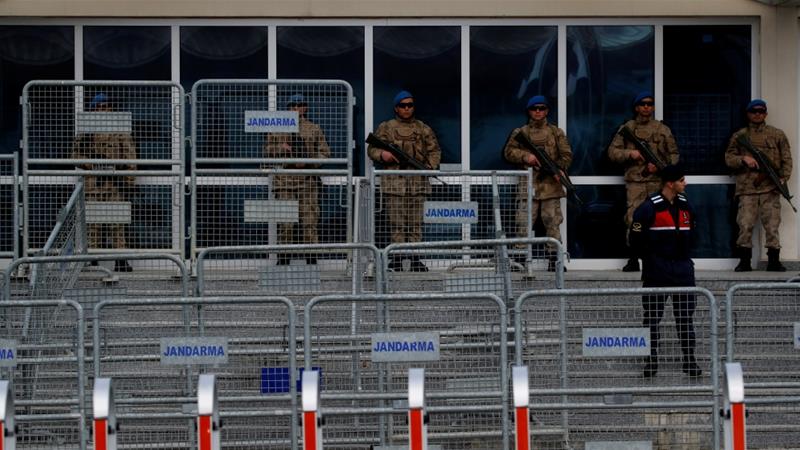Home » Middle East »
Turkey to free one-third of its prisoners to curb coronavirus
A bill passed by Turkey’s parliament will see 45,000 prisoners temporarily released to limit the spread of COVID-19.
Turkish MPs have agreed to free nearly one-third of the country’s prisoners to reduce the threat from coronavirus in jails, but the move was criticised for excluding government opponents imprisoned on terrorism charges.
The bill, introduced by President Recep Tayyip Erdogan’s Justice and Development Party (AK Party), will see 45,000 temporarily released to limit the spread of coronavirus. A similar number will be freed permanently under plans proposed last year to cut chronic overcrowding.
More:
-
Turkey imposes 48-hour curfew in major cities to curb virus
-
Hope as 93-year-old Turkish woman recovers from coronavirus
-
Why Turkey is facing a steep curve of new coronavirus cases
Those convicted of or awaiting trial for “terrorism” offences – including many government opponents jailed on what have been slammed as trumped-up charges – are exempt from the amnesty.
The bill was passed by the parliamentary majority enjoyed by the AK Party and its nationalist allies by 279 votes to 51, said Sureyya Sadi Bilgic, the deputy parliamentary speaker, on Tuesday.
Since a failed military coup in 2016, tens of thousands of politicians, journalists, rights campaigners, civil servants, judicial officials and military personnel have been jailed in a crackdown.
‘Grave injustice’
Justice Minister Abdulhamid Gul said on Monday that 17 prisoners from open prisons had contracted coronavirus, including three who died. However, overcrowding has led to fears the virus could exacerbate an outbreak in the country’s 355 prisons.
Turkey’s Human Rights Association last week called for those prisoners with critical illnesses, above 60 and pregnant women or those jailed with their children to be released.
One of the most prominent prisoners excluded from the amnesty is Selahattin Demirtas, the former co-chair of Turkey’s second-largest opposition party. Accused of leading a “terrorist” organisation, he has been held in prison since November 2016.
The 46-year-old was hospitalised in December following chest pains. His lawyer Mahsuni Karaman said Demirtas is at high risk from coronavirus due to high blood pressure and because he has undergone surgery for respiratory problems.
Another prisoner at risk is 70-year-old Ahmet Altan, a leading journalist jailed for life in 2018 on the charge of aiding a terrorist group. The sentence was later overturned and he was released, only to be jailed again the following week.
Turkey, Europe’s second-biggest jailer with some 294,000 inmates, also has the continent’s highest number of older prisoners – more than 3,500 aged 65 and above, according to Council of Europe data from January 2019. This age group is among those subject to a government order to stay at home due to the high risk they face from coronavirus.
The opposition has previously said it would take the bill to the Constitutional Court if passed. However, given the 15-member court is dominated by Erdogan appointees, it is unlikely to interfere.
Can Dundar, the former editor of the Cumhuriyet newspaper who fled to Germany after being charged over the paper’s coverage of arms shipments to Syria, called the bill a “grave injustice” in the Washington Post last week.
He described a scenario in which “a bureaucrat who accepts bribes could be released, while the journalist who reports on the bribery would remain imprisoned”.
Faik Oztrak, a spokesman for the opposition Republican People’s Party (CHP), said: “You’re holding dissidents, journalists and intellectuals inside [while] you set the vicious thief free. This is clearly called political opportunism.”
Under the law, prisoners will be initially released until May 31, with an option to extend this further.
“They will still serve their terms,” Naci Bostanci, the AK Party’s parliamentary chairman, said. “This is not a political matter … People will be punished if they commit a crime but we have to look at it from the perspective of rehabilitation and how such sentences will impact their lives in the long term.”
Source: Read Full Article



